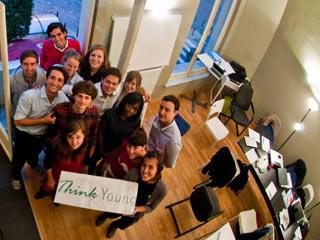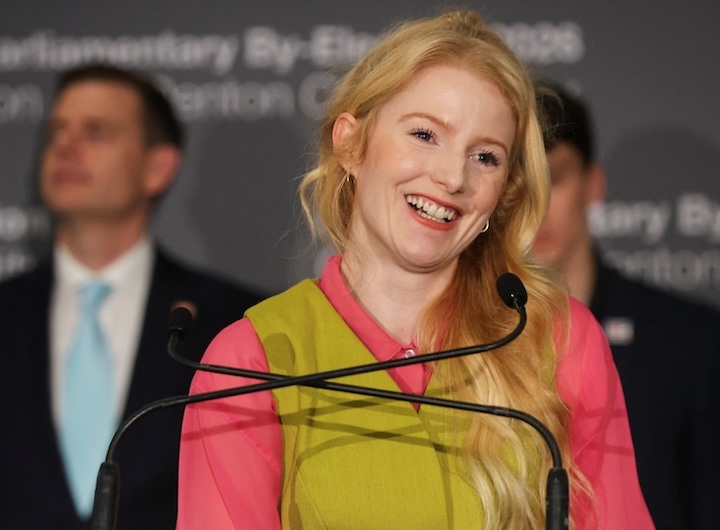Among them one of the three founders of the think-tank, Andrea Gerosa, as usual dynamic and relaxed. An interview and due espressi.
EBR – Andrea, why did you start ThinkYoung in 2007? There existed already so many think tanks.
Andrea Gerosa (AG) - The three founders of ThinkYoung, Stefano Benini, Azzurra Giorgio and I observed that there was a lack of representation of young people within the European institutions and we wanted to make a concrete change over that. We invested 25 euro to register our website and started doing research and surveys on and about young people. At that time all three of us had another job, so we had to do the ThinkYoung work during evenings and weekends.
EBR – What is your background?
AG – We have the same background, we studied at Bocconi University in Milan and were members of JADE, the network of student-entrepreneurs. But we have different personalities and interests. So our first steps were in various professional fields. At the beginning Azzurra was in charge of research, Stefano of the website and I was in charge of cooperation and networking.
EBR – What is Think Young doing exactly and who is doing that work for whom?
AG - ThinkYoung is a nonprofit organisation that runs projects which make Europe a better place for young people. We do research and surveys; organise conferences and produce documentaries on and about young people. As a think-tank we lobby for young people. The team exists of only young people, mainly recent graduates or engaged students.
EBR – What is the response and feedback on ThinkYoung’s work?
AG - Whenever we talk about ThinkYoung people tend to be very enthusiastic about the idea. In general we work with the same partners since four years, what means that they are happy and satisfied with our results and share our mission through the years.
EBR – What are your standards and how do you keep these up?
AG - We have learnt “knowledge management” by doing it. At the very beginning the team had only part-time collaborators based in four different countries. Internet and other related innovative tools supported our work. New hired colleagues are young and it is not always easy to channel their creativity, enthusiasm and motivation. But once that is done, they learn much faster and in a larger scale than older generations. We use software for project management and all our knowledge is online, making it easy for new comers to have access to documents. In fact we are a “paperless” organisation; there is absolutely no paper in the office.
EBR – How did ThinkYoung grow so fast?
AG - God bless the crisis. Thanks to it we had the chance to rent cheap offices and institutions started looking for out-of-the-box ideas. We managed to be at the right place at the right time.
Both the European institutions and well established think-tanks liked our work and invited us more and more to present our results during conferences and seminars. Later on we started to organise our own conferences and since two years we also produce documentaries to present the visions and opinions of young people.
Nowadays young people are everywhere on the news. The fact that we started four years ago gave us credibility and quite a strong competitive advantage.
EBR – Are the founders happy with the developments?
AG - We can always do better. But yes, we are very happy. In February 2007 we had just enough money, people and resources to plan until April 2007. In 2009 we had a four months plan. Today (November 2011) we are in the situation that we can make plans until December 2012. We started with one laptop and a desk in a shared office. Today we have an office right in front of the European Parliament, a staff of six full time and twenty people around Europe part time. Not bad… in these times of crisis!
EBR – Are the developments in line with the original expectations? And what are the expectations for the future?
AG - We have done much more than expected in terms of “in the field” projects, together with young people all around Europe. As well we have involved a much higher number of young opinion makers than we expected. Looking at what we could do better? We think we need more presence within the European Commission and in the media debate.
EBR – And what is the future role of the founders, when they grow too old to be a young thinker?
AG – The three founders have always said that ThinkYoung has to be run by young people for young people. Today the founders are not involved in field projects but only in project acquisition and management. In the near future we will act as an advisory board and young staff members will take over the daily and midterm strategic management.
EBR – Thank you Andrea. It is really a great story. Congratulations for the founders and all their young co-operators!
ThinkYoung: a unique success story in times of crisis
Being welcomed in the headquarters of ThinkYoung is a great experience. Young people concentrated on their laptops, in an office that faces the megalomane megalith buildings of the European Parliament, Place Luxembourg Brussels;


God bless the crisis. Thanks to it we had the chance to rent cheap offices and institutions started looking for out-of-the-box ideas. We managed to be at the right place at the right time.




